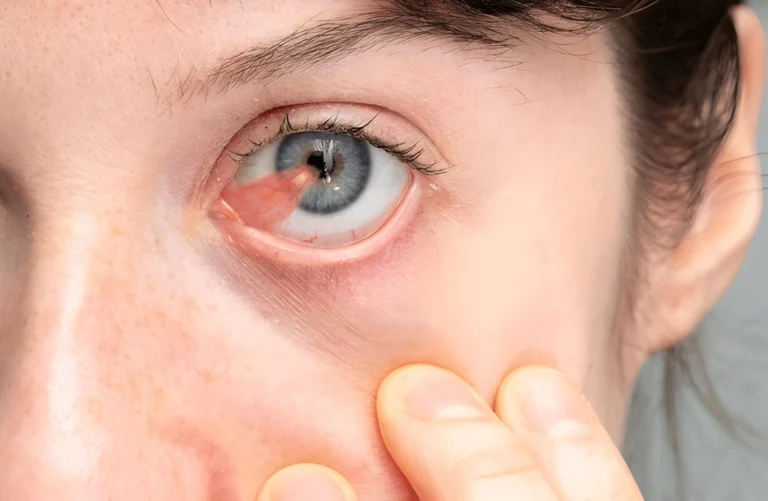When it comes to eye health, awareness is crucial. One condition that is often unnoticed until it becomes bothersome is pterygium, commonly known as Surfer’s Eye. If left untreated, it can significantly impact vision. Pterygium surgery is a quick and best solution for improved eye health.
What is Pterygium?
Pterygium, or Surfer’s Eye, is a benign growth of the conjunctiva, which is a clear tissue covering the white part of the eye and the inner side of the eyelids. The growth typically starts on the side closest to the nose and extends toward the cornea, the clear front surface of the eye. While it may start small, in some cases, it can grow large enough to disturb vision by covering the cornea.
Pterygium is commonly seen in individuals who spend more time outdoors, especially in sunny, windy, or dusty environments. Although the condition is benign, meaning it is not cancerous, it can cause discomfort and may require pterygium eye surgery to prevent vision impairment.
Causes of Pterygium
- Prolonged exposure to UV light, particularly from the sun, is a risk factor for developing pterygium.
- Dust, wind, and sand can irritate the eye, leading to the development of pterygium.
- Chronic dryness of the eyes can contribute to the formation of pterygium. The irritation caused by dry eyes can promote the growth of the conjunctival tissue over the cornea.
Symptoms of Pterygium
The symptoms of pterygium can vary depending on the size and progression of the growth.
- The most obvious sign of pterygium is the presence of a fleshy, triangular growth on the white part of the eye, which may gradually extend onto the cornea.
- Pterygium can cause chronic redness and irritation, making the eyes appear bloodshot.
- A sensation of having something in the eye, which can be uncomfortable and distracting.
- In advanced cases, pterygium can grow over the cornea, leading to vision impairment or distortion. This occurs because the growth can alter the shape of the cornea and requires you to undergo pterygium surgery.
- Pterygium often causes symptoms associated with dry eyes, such as burning, itching, and a gritty sensation.
Treatment Options for Pterygium
Non-Surgical Treatments
For mild cases of pterygium, non-surgical treatments may effectively manage symptoms and prevent the condition from worsening.
- Artificial tears or lubricating eye drops can help alleviate dryness and irritation associated with pterygium.
- In some cases, your ophthalmologist may prescribe topical steroid eye drops to reduce inflammation and redness.
- Wearing sunglasses with UV protection is crucial for preventing the progression of pterygium and protecting the eyes from further damage.
- Reducing exposure to environmental irritants, such as wind and dust, can help manage symptoms.
Pterygium Surgery
Pterygium eye surgery may be necessary when non-surgical treatments are insufficient or if the pterygium threatens vision by encroaching on the cornea. This delicate procedure removes abnormal tissue and prevents recurrence.
- Procedure
Pterygium surgery involves the surgical removal of the pterygium tissue from the eye. During the procedure, the eye surgeon carefully excises the growth and may also perform an autograft, where healthy conjunctival tissue from another part of the eye is transplanted to the affected area to aid healing and eliminate the risk of recurrence.
- Recovery Process
Post pterygium surgery care is crucial for a successful recovery. Patients are typically prescribed anti-inflammatory and antibiotic eye drops to prevent infection and manage inflammation. Avoiding direct sunlight, dust, and other irritants during the healing process is also essential.
Risks and Complications
As with any surgery, there are risks associated with pterygium eye surgery as well. These may include infection, scarring, and, in rare cases, pterygium recurrence. However, modern surgical techniques have significantly reduced the likelihood of these complications. Pterygium, or Surfer’s Eye, is a common condition, especially among those exposed to UV radiation and environmental irritants. While often benign, it can cause significant discomfort and vision problems if not addressed. Regular eye checkups are vital in maintaining eye health and preventing serious complications from developing. Shri Venkatesh Eye Institute focuses on comprehensive eye exams and early detection of eye problems. Prompt treatment and advanced technology help perform pterygium surgery without causing discomfort to the patient.

